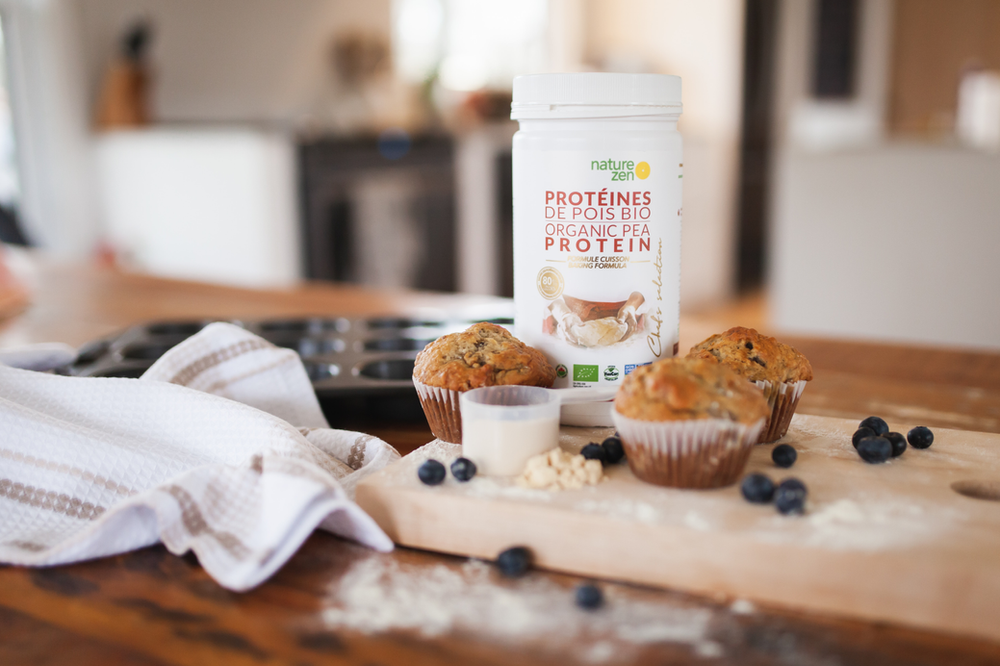In the world of fitness and strength training, understanding the significance of protein is key to achieving muscle gain. Let's explore why protein is so crucial and take a closer look at its role in building muscles.
Protein is like the building blocks for your muscles. When you work out, your muscles go through a process of breaking down and repairing. Protein plays a vital role in this repair process, helping your muscles grow stronger and bigger.
It's essentially the fuel your body needs to boost muscle development.
Think of protein as the superhero in your body's story of muscle building. It not only repairs your muscles but also helps in creating new muscle tissues. Whether you're lifting weights, running, or doing any physical activity, protein is there to support your muscles, ensuring they become more resilient and powerful.
In this overview, we'll dive into how much protein should i eat to gain muscle and how it effects the incredible journey of muscle building.
Understanding Protein Requirements
To know how much protein your body needs, we have to consider several factors that influence these requirements. Let's break it down:
Factors Influencing Protein Needs
1.Body We
ight and Composition
The amount of protein your body requires depends on how much you weigh and what your body is made of. If you're trying to gain muscle, your protein needs might differ from someone with different body weight and composition.
2. Activity Level and Type of Exercise
How active you are and the kind of exercises you engage in also play a crucial role. Athletes and individuals with high-intensity workout routines generally need more protein to support their muscles during and after physical activity.
3.Fitness G
oals (Muscle Gain)
Your fitness goals, especially if they involve gaining muscle, impact your protein requirements. Muscle growth demands additional protein to facilitate the repair and development of muscle tissues. Understanding your specific fitness goals helps tailor your protein intake to achieve optimal results.
Protein Intake Guidelines
Now that we know the factors influencing protein needs, let's explore some guidelines to ensure you're getting the right amount for muscle growth.
Recommended Daily Protein Intake
Understanding and meeting your recommended daily protein intake is fundamental to supporting overall health and achieving fitness goals. The amount of protein your body needs can vary based on factors such as age, weight, activity level, and fitness objectives.
Generally, a common guideline suggests consuming a specific amount of protein per kilogram of body weight.
For sedentary individuals, this might be around 0.8 grams per kilogram, while those engaged in regular physical activity or muscle-building activities may require higher amounts.
Protein is essential for maintaining and repairing tissues, supporting immune function, and serving as a crucial component in enzyme and hormone production.
By ensuring that you meet your recommended daily protein intake, you provide your body with the necessary building blocks for optimal health and fitness, contributing to muscle maintenance and overall well-being.
Protein Distribution Throughout the Day
Distributing protein intake throughout the day is a nutritional strategy that promotes sustained muscle protein synthesis and overall well-being. Instead of concentrating all your protein in one or two meals, spreading it across multiple meals ensures a constant supply of amino acids for your body.
This consistent availability is particularly beneficial for muscle repair and growth. Starting your day with a protein-rich breakfast sets a positive tone, providing essential nutrients after the overnight fasting period.
Including protein in each meal and snack maintains a steady influx of amino acids, supporting various bodily functions beyond muscle development, such as immune function and hormone regulation.
By prioritizing protein distribution, you not only optimize your body's ability to build and maintain muscle but also promote a balanced and sustained approach to nutrition throughout the day.
Protein Sources for Muscle Building
To meet your protein needs, it's crucial to choose the right sources. Here are three main categories:
- Animal-Based Proteins
- Plant-Based Proteins
- Supplements
By incorporating a mix of these protein sources, you can tailor your diet to support muscle building effectively.
Protein and Timing
Now that we've covered the basics, let's delve into the crucial aspect of when you consume your protein – timing matters!
Importance of Protein Timing in Muscle Gain
The importance of protein timing in muscle gain cannot be overstated, as the timing of protein consumption plays a pivotal role in optimizing the effects of resistance training and promoting muscle protein synthesis.
Consuming protein before a workout provides a readily available source of amino acids during exercise, enhancing muscle protein balance and minimizing muscle protein breakdown.
Post-workout, the body is in a heightened state of receptivity, making it an opportune time to replenish glycogen stores and initiate the recovery process.
This strategic approach ensures that the essential amino acids required for muscle repair and growth are available when the muscles need them the most. Beyond immediate recovery, consistent attention to protein timing helps sustain an anabolic environment, fostering continuous muscle development.
Whether through whole foods or supplements, aligning protein intake with workout timing is a key component of a comprehensive strategy for maximizing muscle gain.
Pre and Post-Workout Protein Consumption
- Pre-Workout: Fueling Up
- Post-Workout: Recovery Boost
Protein Intake Around Workouts for Optimal Results
Optimizing protein intake around workouts is a strategic approach to fueling your body for enhanced performance and maximizing muscle gain. Timing plays a crucial role in the effectiveness of your protein consumption.
Consuming protein before a workout provides your muscles with the necessary amino acids, acting as a source of energy and aiding in the prevention of muscle breakdown during exercise.
Post-workout, the body is primed for nutrient absorption, making it an opportune time to replenish glycogen stores and initiate the muscle repair process.
By strategically incorporating protein into your meals surrounding your exercise routine, you ensure a continuous supply of nutrients critical for muscle development. This approach not only supports immediate recovery but also contributes to long-term gains, making each workout more impactful in achieving your fitness goals.
Whether through whole foods or supplements, thoughtful consideration of protein intake around workouts is a key component of a comprehensive strategy for optimal results.
Protein Quality and Digestibility
As we delve into the complexities of protein, it becomes crucial to evaluate both its quality and digestibility for optimal utilization by the body.
Assessing Protein Quality
1.Comple
te vs. Incomplete Proteins
When it comes to protein, not all sources are created equal. Some proteins contain all the essential amino acids our bodies need, while others lack certain amino acids. Complete proteins, found in animal-based sources like meat, eggs, and dairy, provide a full spectrum of amino acids.
Incomplete proteins, often found in plant-based sources, may need to be combined to ensure a balanced amino acid profile.
2. Amino Acid Profile
Amino acids are the building blocks of proteins, and their profile determines the quality of a protein source. Assessing the amino acid composition is crucial to understand how well a protein source can contribute to muscle building and overall health.
B. Digestibility Considerations for Effective Protein Utilization
Protein quality isn't just about what's present; it's also about how well your body can digest and absorb it.
Considering the digestibility of protein ensures that your body can efficiently break down and utilize the amino acids for various bodily functions, including muscle repair and growth.
In summary, understanding protein quality involves assessing the completeness of amino acids in your protein sources, whether they are complete or incomplete proteins.
Additionally, considering the digestibility of these proteins ensures effective utilization by your body, contributing to your overall health and fitness goals.
Common Myths and Misconceptions
As we navigate the realm of protein and muscle gain, it's essential to debunk prevalent myths and clarify misconceptions to ensure accurate information.
Debunking Myths About Excessive Protein Intake
Contrary to popular belief, more isn't always better, especially when it comes to protein intake.
Let's dispel some myths surrounding excessive protein consumption:
1. Myth: The More Protein, the Better
Excessive protein intake doesn't necessarily translate to more muscle gain. There's an optimal range for protein consumption, and exceeding it may not provide additional benefits. Understanding the right amount for your body and goals is key.
2.Myth: Prot
ein Only Benefits Muscle Growth
While protein is vital for muscle repair and growth, it's not its only role. Protein contributes to various bodily functions, including enzyme production, immune system support, and hormone regulation.
Clarifying Misconceptions Related to Muscle Gain
Addressing misconceptions related to muscle gain helps individuals make informed decisions about their dietary choices and workout routines:
1. Misconception: Cardio Doesn't Require Protein Intake
Some believe that protein is only essential for weightlifting or resistance training. However, cardiovascular exercise also places demands on your muscles, emphasizing the importance of protein intake for overall fitness.
2.Misc
onception: Protein Equals Bulking Up
There's a misconception that increasing protein intake will automatically lead to bulky muscles. In reality, muscle gain involves a combination of factors, including exercise type, intensity, and overall diet.
By debunking these myths and clarifying misconceptions, we empower individuals to make informed choices, optimizing their protein intake for effective and balanced muscle gain.
Potential Risks and Considerations
As we explore the benefits of protein for muscle gain, it's crucial to acknowledge potential risks and consider individual variations in dietary needs.
Health Implications of High Protein Diets
- Kidney Strain Concerns
- Digestive Issues
Individual Variations and Consulting with a Healthcare Professional
- Biochemical Individuality
- Consulting with a Healthcare Professional
In summary, while protein is essential for muscle gain, it's vital to be aware of potential health implications associated with high protein diets. Understanding individual variations and seeking professional advice ensures a balanced and tailored approach to protein intake, promoting overall health and well-being.
Conclusion
As we conclude our exploration of protein and its role in muscle gain, let's recap key points and highlight the significance of tailoring protein intake to individual needs.
Recap of Key Points
- Importance of Protein: Protein is the essential building block for muscle growth, aiding in muscle repair and development.
- Understanding Protein Requirements: Factors like body weight, activity level, and fitness goals influence the amount of protein needed.
- Protein Intake Guidelines: Consider the recommended daily intake, distribution throughout the day, and diverse protein sources for optimal muscle-building results.
- Protein and Timing: The timing of protein consumption, especially around workouts, plays a crucial role in muscle gain.
- Protein Quality and Digestibility: Assessing the quality of protein involves understanding complete vs. incomplete proteins and considering the amino acid profile. Digestibility ensures effective utilization.
- Common Myths and Misconceptions: Debunking myths about excessive protein intake and clarifying misconceptions related to muscle gain.
- Potential Risks and Considerations: Being aware of health implications, individual variations, and consulting with healthcare professionals when needed.
How much Protein should i eat to Gain Muscle?
The ideal amount of protein to eat for muscle gain varies based on individual factors such as body weight, activity level, and fitness goals.
A commonly recommended guideline suggests consuming around 1.6 to 2.2 grams of protein per kilogram of body weight for those actively pursuing muscle gain.
However, it's crucial to consider personal factors, including the type and intensity of workouts. Some individuals may require higher protein intake to support their muscle-building efforts.
Consulting with a healthcare professional or a registered dietitian can help determine a personalized protein goal tailored to your specific needs and objectives, ensuring an effective and balanced approach to gaining muscle.
The Importance of Personalized Protein Intake
The journey to muscle gain is not one-size-fits-all. The importance of tailoring your protein intake to your unique needs cannot be overstated. Factors such as body composition, fitness goals, and health conditions vary among individuals.
Personalizing your protein intake ensures that you're meeting your specific requirements for optimal results.
Resources and Further Reading
For those eager to delve deeper into the world of protein and muscle gain, here are additional references and sources:
- American Council on Exercise (ACE)
- PubMed - Protein Intake and Muscle Mass
Recommended Books:
- "The New Rules of Lifting for Women" by Lou Schuler and Alwyn Cosgrove
- "Protein Power: The High-Protein/Low-Carbohydrate Way to Lose Weight, Feel Fit, and Boost Your Health--in Just Weeks!" by Michael R. Eades and Mary Dan Eades
These resources provide a wealth of information to further enhance your understanding and guide you on your journey toward effective muscle gain. Remember, knowledge empowers progress. Happy reading and happy lifting!
Original Article












